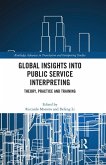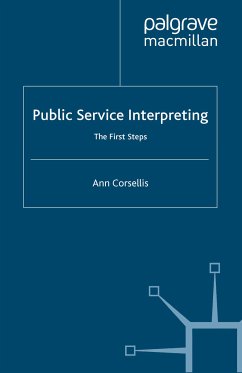The Routledge Handbook of Public Service Interpreting (eBook, PDF)
Redaktion: Gavioli, Laura; Wadensjö, Cecilia
46,95 €
46,95 €
inkl. MwSt.
Sofort per Download lieferbar

23 °P sammeln
46,95 €
Als Download kaufen

46,95 €
inkl. MwSt.
Sofort per Download lieferbar

23 °P sammeln
Jetzt verschenken
Alle Infos zum eBook verschenken
46,95 €
inkl. MwSt.
Sofort per Download lieferbar
Alle Infos zum eBook verschenken

23 °P sammeln
The Routledge Handbook of Public Service Interpreting (eBook, PDF)
Redaktion: Gavioli, Laura; Wadensjö, Cecilia
- Format: PDF
- Merkliste
- Auf die Merkliste
- Bewerten Bewerten
- Teilen
- Produkt teilen
- Produkterinnerung
- Produkterinnerung

Bitte loggen Sie sich zunächst in Ihr Kundenkonto ein oder registrieren Sie sich bei
bücher.de, um das eBook-Abo tolino select nutzen zu können.
Hier können Sie sich einloggen
Hier können Sie sich einloggen
Sie sind bereits eingeloggt. Klicken Sie auf 2. tolino select Abo, um fortzufahren.

Bitte loggen Sie sich zunächst in Ihr Kundenkonto ein oder registrieren Sie sich bei bücher.de, um das eBook-Abo tolino select nutzen zu können.
This Handbook is a comprehensive overview of research in Public Service, or Community Interpreting. It offers reflections and suggestions for improving public service communication in plurilingual settings and provides tools for dealing with public service communication in a global society.
- Geräte: PC
- ohne Kopierschutz
- eBook Hilfe
- Größe: 8.14MB
Andere Kunden interessierten sich auch für
![Global Insights into Public Service Interpreting (eBook, PDF) Global Insights into Public Service Interpreting (eBook, PDF)]() Global Insights into Public Service Interpreting (eBook, PDF)42,95 €
Global Insights into Public Service Interpreting (eBook, PDF)42,95 €![Challenges and Opportunities in Public Service Interpreting (eBook, PDF) Challenges and Opportunities in Public Service Interpreting (eBook, PDF)]() Challenges and Opportunities in Public Service Interpreting (eBook, PDF)61,95 €
Challenges and Opportunities in Public Service Interpreting (eBook, PDF)61,95 €![Public Service Interpreting (eBook, PDF) Public Service Interpreting (eBook, PDF)]() A. CorsellisPublic Service Interpreting (eBook, PDF)81,95 €
A. CorsellisPublic Service Interpreting (eBook, PDF)81,95 €![The Routledge Handbook of Sign Language Translation and Interpreting (eBook, PDF) The Routledge Handbook of Sign Language Translation and Interpreting (eBook, PDF)]() The Routledge Handbook of Sign Language Translation and Interpreting (eBook, PDF)46,95 €
The Routledge Handbook of Sign Language Translation and Interpreting (eBook, PDF)46,95 €![The Routledge Handbook of Translation, Interpreting and Bilingualism (eBook, PDF) The Routledge Handbook of Translation, Interpreting and Bilingualism (eBook, PDF)]() The Routledge Handbook of Translation, Interpreting and Bilingualism (eBook, PDF)46,95 €
The Routledge Handbook of Translation, Interpreting and Bilingualism (eBook, PDF)46,95 €![Translation and Public Policy (eBook, PDF) Translation and Public Policy (eBook, PDF)]() Translation and Public Policy (eBook, PDF)43,95 €
Translation and Public Policy (eBook, PDF)43,95 €![The Routledge Handbook of Korean Interpreting (eBook, PDF) The Routledge Handbook of Korean Interpreting (eBook, PDF)]() The Routledge Handbook of Korean Interpreting (eBook, PDF)46,95 €
The Routledge Handbook of Korean Interpreting (eBook, PDF)46,95 €-
-
-
This Handbook is a comprehensive overview of research in Public Service, or Community Interpreting. It offers reflections and suggestions for improving public service communication in plurilingual settings and provides tools for dealing with public service communication in a global society.
Dieser Download kann aus rechtlichen Gründen nur mit Rechnungsadresse in A, B, BG, CY, CZ, D, DK, EW, E, FIN, F, GR, HR, H, IRL, I, LT, L, LR, M, NL, PL, P, R, S, SLO, SK ausgeliefert werden.
Produktdetails
- Produktdetails
- Verlag: Taylor & Francis eBooks
- Seitenzahl: 450
- Erscheinungstermin: 31. Januar 2023
- Englisch
- ISBN-13: 9781000804812
- Artikelnr.: 67164884
- Verlag: Taylor & Francis eBooks
- Seitenzahl: 450
- Erscheinungstermin: 31. Januar 2023
- Englisch
- ISBN-13: 9781000804812
- Artikelnr.: 67164884
- Herstellerkennzeichnung Die Herstellerinformationen sind derzeit nicht verfügbar.
Laura Gavioli is a Professor of English language and English-Italian translation at the University of Modena and Reggio Emilia and an expert in institutional, cross-cultural interaction. Since the beginning of the 2000s, she has published work on interpreter-mediated interaction, including a recent paper, with Cecilia Wadensjö , published in Health Communication (39/9, 2021). Cecilia Wadensjö is a Professor of Interpreting and Translation Studies at Stockholm University. Since the early 1990s, she has published research on naturally occurring interpreter-mediated institutional discourse, e.g. the book Interpreting as Interaction (Routledge, 2016). She is a member of the editorial board of Interpreting: International Journal of Research and Practice in Interpreting.
List of Contributors Introduction Part 1. Theoretical and methodological approaches 1. General issues about PSI
Carmen Valero
Garcés 2. The ambiguity of interpreting
Kristina Gustafsson 3. Agency in and for mediating in public service interpreting
Claudio Baraldi 4. Cultural assumptions, positioning and power
Ian Mason 5. Corpus
based studies of public service interpreting
Bernd Meyer 6. Technology use in language
discordant interpersonal healthcare communication
Sabine Braun, Khetam Al Sharou and Özlem Temizöz 7. Public service translation:
Mustapha Taibi Part 2. Exploring PSI settings 8. PSI in court
face
to
face interaction.
Philipp Sebastian Angermeyer 9. Research on interpreter
mediated asylum interviews
Sonja Pöllabauer 10. Consecutive interpreting and multimodal sequences
Christian Licoppe 11. Vulnerable encounters? Investigating vulnerability in interpreter
mediated services for victim
survivors of domestic violence and abuse
Rebecca Tipton 12. PSI in healthcare
Laura Gavioli and Raffaela Merlini 13. Challenges and remedies for interpreter
mediated dementia assessments
Charlotta Plejert 14. Public service interpreting in social care
Dorien Van De Mieroop, Antoon Cox and Koen Kerremans 15. A shared responsibility for facilitating inclusion in school settings where sign
language interpreting is provided
Sigrid Slettebakk Berge Part 3. Training and professionalization 16. "Interpreter's mistake"
why should other professions care about the professionalization of interpreters?
Hanne Skaaden 17. Training sign language interpreters for public service interpreting
Christopher A. Stone, Cynthia B. Roy and Jeremy L. Brunson 18. Role play as a means of training and testing public service interpreting
Magnus Dahnberg 19. Monitoring in dialogue interpreting
Elisabet Tiselius and Birgitta Englund Dimitrova 20. Blended learning is here to stay! Combining on
line and on
campus learning in the education of public service interpreters
Gry Sagli and Hanne Skaaden 21. The conversation analytic role
play method:
Natacha Niemants, Jessica Pedersen Belisle Hansen and Elizabeth Stokoe 22. Training interpreters in asylum settings
Anna Claudia Ticca, Véronique Traverso and Emilie Jouin 23. Interprofessional education ... interpreter education
Demi Krystallidou 24. Training public service providers in how to communicate via interpreter
Tatjana R. Felberg and Gry Sagli 25. Education and training of public service interpreter teachers
Mira Kadri¿ and Sonja Pöllabauer Index
Carmen Valero
Garcés 2. The ambiguity of interpreting
Kristina Gustafsson 3. Agency in and for mediating in public service interpreting
Claudio Baraldi 4. Cultural assumptions, positioning and power
Ian Mason 5. Corpus
based studies of public service interpreting
Bernd Meyer 6. Technology use in language
discordant interpersonal healthcare communication
Sabine Braun, Khetam Al Sharou and Özlem Temizöz 7. Public service translation:
Mustapha Taibi Part 2. Exploring PSI settings 8. PSI in court
face
to
face interaction.
Philipp Sebastian Angermeyer 9. Research on interpreter
mediated asylum interviews
Sonja Pöllabauer 10. Consecutive interpreting and multimodal sequences
Christian Licoppe 11. Vulnerable encounters? Investigating vulnerability in interpreter
mediated services for victim
survivors of domestic violence and abuse
Rebecca Tipton 12. PSI in healthcare
Laura Gavioli and Raffaela Merlini 13. Challenges and remedies for interpreter
mediated dementia assessments
Charlotta Plejert 14. Public service interpreting in social care
Dorien Van De Mieroop, Antoon Cox and Koen Kerremans 15. A shared responsibility for facilitating inclusion in school settings where sign
language interpreting is provided
Sigrid Slettebakk Berge Part 3. Training and professionalization 16. "Interpreter's mistake"
why should other professions care about the professionalization of interpreters?
Hanne Skaaden 17. Training sign language interpreters for public service interpreting
Christopher A. Stone, Cynthia B. Roy and Jeremy L. Brunson 18. Role play as a means of training and testing public service interpreting
Magnus Dahnberg 19. Monitoring in dialogue interpreting
Elisabet Tiselius and Birgitta Englund Dimitrova 20. Blended learning is here to stay! Combining on
line and on
campus learning in the education of public service interpreters
Gry Sagli and Hanne Skaaden 21. The conversation analytic role
play method:
Natacha Niemants, Jessica Pedersen Belisle Hansen and Elizabeth Stokoe 22. Training interpreters in asylum settings
Anna Claudia Ticca, Véronique Traverso and Emilie Jouin 23. Interprofessional education ... interpreter education
Demi Krystallidou 24. Training public service providers in how to communicate via interpreter
Tatjana R. Felberg and Gry Sagli 25. Education and training of public service interpreter teachers
Mira Kadri¿ and Sonja Pöllabauer Index
List of Contributors Introduction Part 1. Theoretical and methodological approaches 1. General issues about PSI
Carmen Valero
Garcés 2. The ambiguity of interpreting
Kristina Gustafsson 3. Agency in and for mediating in public service interpreting
Claudio Baraldi 4. Cultural assumptions, positioning and power
Ian Mason 5. Corpus
based studies of public service interpreting
Bernd Meyer 6. Technology use in language
discordant interpersonal healthcare communication
Sabine Braun, Khetam Al Sharou and Özlem Temizöz 7. Public service translation:
Mustapha Taibi Part 2. Exploring PSI settings 8. PSI in court
face
to
face interaction.
Philipp Sebastian Angermeyer 9. Research on interpreter
mediated asylum interviews
Sonja Pöllabauer 10. Consecutive interpreting and multimodal sequences
Christian Licoppe 11. Vulnerable encounters? Investigating vulnerability in interpreter
mediated services for victim
survivors of domestic violence and abuse
Rebecca Tipton 12. PSI in healthcare
Laura Gavioli and Raffaela Merlini 13. Challenges and remedies for interpreter
mediated dementia assessments
Charlotta Plejert 14. Public service interpreting in social care
Dorien Van De Mieroop, Antoon Cox and Koen Kerremans 15. A shared responsibility for facilitating inclusion in school settings where sign
language interpreting is provided
Sigrid Slettebakk Berge Part 3. Training and professionalization 16. "Interpreter's mistake"
why should other professions care about the professionalization of interpreters?
Hanne Skaaden 17. Training sign language interpreters for public service interpreting
Christopher A. Stone, Cynthia B. Roy and Jeremy L. Brunson 18. Role play as a means of training and testing public service interpreting
Magnus Dahnberg 19. Monitoring in dialogue interpreting
Elisabet Tiselius and Birgitta Englund Dimitrova 20. Blended learning is here to stay! Combining on
line and on
campus learning in the education of public service interpreters
Gry Sagli and Hanne Skaaden 21. The conversation analytic role
play method:
Natacha Niemants, Jessica Pedersen Belisle Hansen and Elizabeth Stokoe 22. Training interpreters in asylum settings
Anna Claudia Ticca, Véronique Traverso and Emilie Jouin 23. Interprofessional education ... interpreter education
Demi Krystallidou 24. Training public service providers in how to communicate via interpreter
Tatjana R. Felberg and Gry Sagli 25. Education and training of public service interpreter teachers
Mira Kadri¿ and Sonja Pöllabauer Index
Carmen Valero
Garcés 2. The ambiguity of interpreting
Kristina Gustafsson 3. Agency in and for mediating in public service interpreting
Claudio Baraldi 4. Cultural assumptions, positioning and power
Ian Mason 5. Corpus
based studies of public service interpreting
Bernd Meyer 6. Technology use in language
discordant interpersonal healthcare communication
Sabine Braun, Khetam Al Sharou and Özlem Temizöz 7. Public service translation:
Mustapha Taibi Part 2. Exploring PSI settings 8. PSI in court
face
to
face interaction.
Philipp Sebastian Angermeyer 9. Research on interpreter
mediated asylum interviews
Sonja Pöllabauer 10. Consecutive interpreting and multimodal sequences
Christian Licoppe 11. Vulnerable encounters? Investigating vulnerability in interpreter
mediated services for victim
survivors of domestic violence and abuse
Rebecca Tipton 12. PSI in healthcare
Laura Gavioli and Raffaela Merlini 13. Challenges and remedies for interpreter
mediated dementia assessments
Charlotta Plejert 14. Public service interpreting in social care
Dorien Van De Mieroop, Antoon Cox and Koen Kerremans 15. A shared responsibility for facilitating inclusion in school settings where sign
language interpreting is provided
Sigrid Slettebakk Berge Part 3. Training and professionalization 16. "Interpreter's mistake"
why should other professions care about the professionalization of interpreters?
Hanne Skaaden 17. Training sign language interpreters for public service interpreting
Christopher A. Stone, Cynthia B. Roy and Jeremy L. Brunson 18. Role play as a means of training and testing public service interpreting
Magnus Dahnberg 19. Monitoring in dialogue interpreting
Elisabet Tiselius and Birgitta Englund Dimitrova 20. Blended learning is here to stay! Combining on
line and on
campus learning in the education of public service interpreters
Gry Sagli and Hanne Skaaden 21. The conversation analytic role
play method:
Natacha Niemants, Jessica Pedersen Belisle Hansen and Elizabeth Stokoe 22. Training interpreters in asylum settings
Anna Claudia Ticca, Véronique Traverso and Emilie Jouin 23. Interprofessional education ... interpreter education
Demi Krystallidou 24. Training public service providers in how to communicate via interpreter
Tatjana R. Felberg and Gry Sagli 25. Education and training of public service interpreter teachers
Mira Kadri¿ and Sonja Pöllabauer Index







